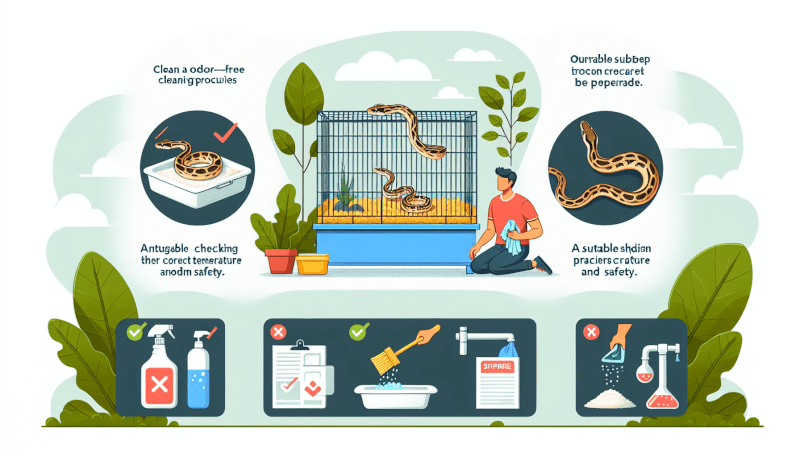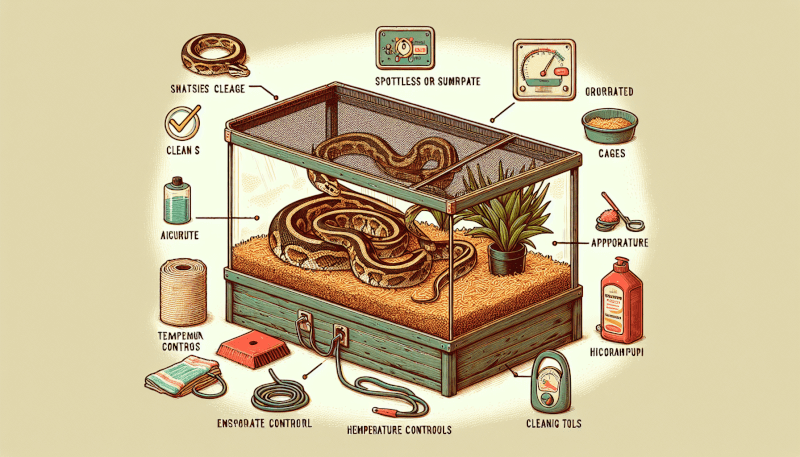Are you a proud snake owner searching for ways to keep your snake’s habitat clean and odor-free? Look no further! In this article, we will explore the top methods to ensure your snake’s home is fresh and comfortable. From proper substrate choices to regular spot cleaning, you’ll discover easy and effective techniques that will keep both you and your snake happy. Say goodbye to unpleasant smells and hello to a pristine snake habitat!
Choosing the Right Substrate
When it comes to choosing the substrate for your snake’s habitat, it is important to use a material that is appropriate for their needs. Avoid using cedar or pine chips as these can release harmful aromatic oils that may be toxic to snakes. Instead, consider using newspaper or reptile carpet as they are safe options that are easy to clean.
Using newspaper as a substrate is a cost-effective and simple solution. It is easy to replace and provides a smooth surface for your snake to move around on. Reptile carpet, on the other hand, is a more durable option that can be washed and reused. It also provides a more natural feel for your snake.
Regular Cleaning Routine
Maintaining a regular cleaning routine is crucial for keeping your snake’s habitat clean and odor-free. Remove droppings and soiled substrate regularly to prevent the buildup of bacteria and odors. Spot clean any visible mess immediately, such as spilled water or food, to ensure a clean environment for your snake.
In addition to regular spot cleaning, it is important to perform a deep clean on the entire habitat regularly. This involves removing all items, disinfecting them, and thoroughly cleaning the enclosure itself. By doing so, you can eliminate any potential bacteria or parasites that may be present and ensure a hygienic habitat for your snake.
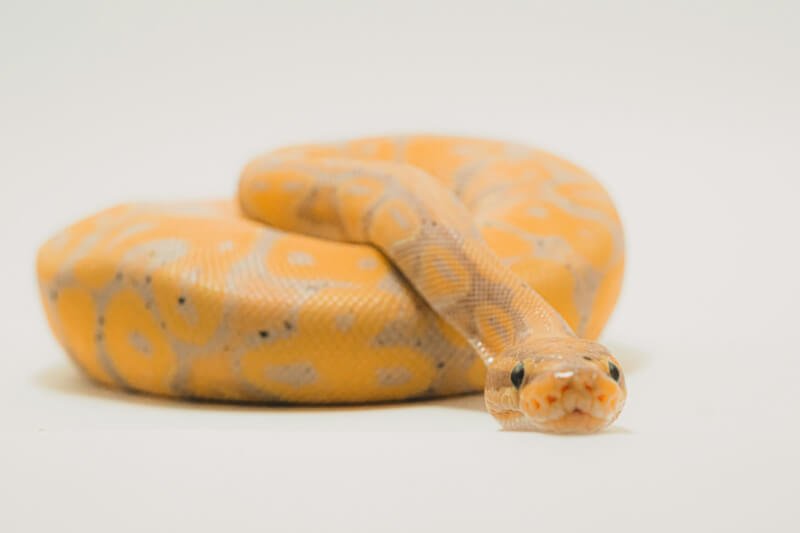
Proper Feeding Practices
Feeding your snake in a separate enclosure is a good practice to follow. This helps to prevent any contamination of the main habitat with leftover food or bodily fluids. After your snake has finished eating, promptly remove any uneaten food to avoid attracting pests or introducing odors into the habitat.
Clean and sterilize feeding dishes after each use to maintain proper hygiene. Use a mild dish detergent and rinse thoroughly to ensure there are no residues left behind. By practicing proper feeding practices, you can minimize the risk of bacterial growth and maintain a clean snake habitat.
Maintaining Optimal Humidity
Providing your snake with a suitable humidity range is essential for their overall health and well-being. Different snake species have different humidity requirements, so it is important to research and understand the specific needs of your snake. Use a hygrometer to monitor humidity levels regularly and make adjustments as necessary.
To maintain proper humidity levels, mist the habitat regularly with water. This will help to create a humid environment for your snake, especially if you live in a dry climate. Be careful not to oversaturate the habitat, as excessive moisture can lead to mold or other issues. Finding the right balance is key to maintaining optimal humidity for your snake.
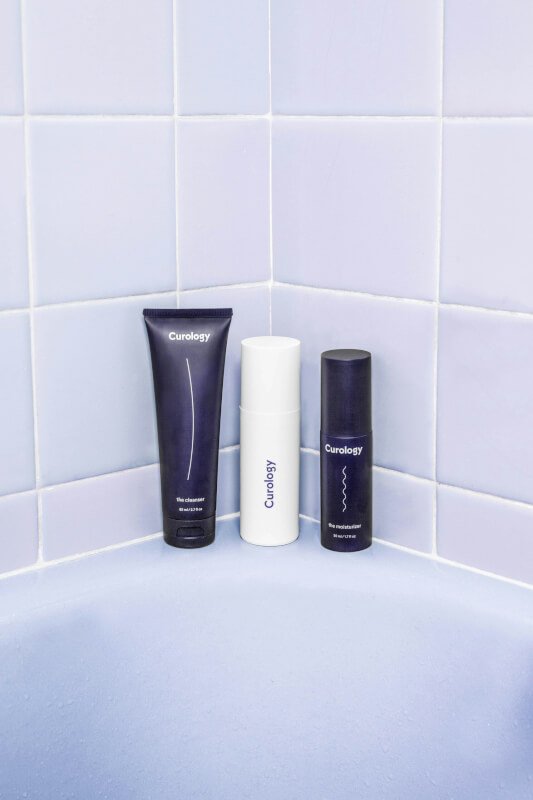
Temperature Regulation
Snakes are ectothermic creatures, which means they rely on external sources of heat to regulate their body temperature. It is important to provide them with a thermal gradient within their habitat. This means having a warm side and a cooler side of the enclosure to allow your snake to choose the temperature they prefer.
Use heat lamps or heating pads to create the warm side of the enclosure. Make sure to position these heat sources appropriately to avoid any direct contact with your snake. It is also important to monitor the temperature with a thermometer to ensure that it remains within the appropriate range for your snake’s species.
Optimizing Air Circulation
Proper air circulation is essential for maintaining a healthy snake habitat. Adequate ventilation helps to prevent the buildup of odors and ensures a fresh and clean environment for your snake. Make sure to provide enough airflow within the enclosure, but also be mindful of drafts that may cause temperature fluctuations.
Avoid excess moisture buildup in the habitat, as this can lead to mold or mildew growth and negatively impact your snake’s health. If needed, you can use fans or air purifiers to improve air circulation and reduce odors. Regularly inspect the habitat for any signs of poor ventilation or moisture issues.

Regular Inspections and Maintenance
Regular inspections and maintenance are necessary to ensure the cleanliness and overall well-being of your snake. Check for any signs of mold or mildew in the enclosure and promptly address these issues if they arise. Inspect and clean water bowls regularly to prevent the growth of bacteria or algae.
Replace any damaged or worn-out items in the habitat, such as hiding spots or branches, to maintain a safe and comfortable environment for your snake. By staying vigilant and addressing any maintenance issues promptly, you can provide the best living conditions for your snake.
Implementing a Quarantine Procedure
When introducing new snakes to your collection, it is important to implement a quarantine procedure. Isolate new snakes for a designated period of time to monitor for any signs of illness or parasites. This helps to prevent the spread of diseases to the rest of your snake population.
During the quarantine period, observe the new snake closely for any changes in behavior or signs of illness. Maintain separate equipment, such as feeding dishes and cleaning tools, for quarantined snakes to avoid cross-contamination. This precautionary measure is crucial for the health and well-being of your entire snake collection.
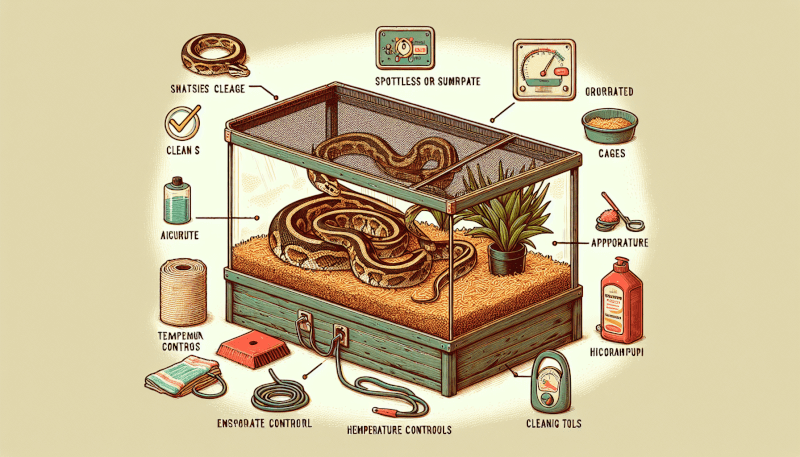
Minimizing Stress for Snakes
Snakes are solitary creatures that prefer a low-stress environment. Provide suitable hiding spots within the habitat, such as caves or branches, where your snake can retreat to when they feel the need. This helps to create a sense of security and reduces stress.
Avoid excessive handling of your snake, as this can cause stress and potentially lead to health issues. Limit handling to necessary occasions, such as when moving or cleaning the enclosure. Additionally, maintaining a consistent day-night cycle by providing a regular light schedule helps to establish a predictable routine for your snake, further minimizing stress.
Regular Vet Check-ups
Just like any other pets, snakes also need regular veterinary check-ups to ensure their health and well-being. Schedule routine visits with a reptile veterinarian who can provide specialized care for your snake. During these visits, discuss any concerns or changes in behavior that you may have noticed.
Follow recommended health protocols provided by your veterinarian, such as vaccinations or parasite prevention measures. Remember that prevention is key when it comes to maintaining the health of your snake. By staying proactive and seeking regular veterinary care, you can ensure that your snake is in the best possible condition.
In conclusion, maintaining a clean and odor-free snake habitat requires a combination of proper substrate choice, regular cleaning routines, appropriate feeding practices, humidity regulation, temperature control, air circulation optimization, regular inspections and maintenance, quarantine procedures, stress minimization, and regular vet check-ups. By following these guidelines, you can provide a healthy and comfortable habitat for your snake, ensuring their overall well-being and happiness.
